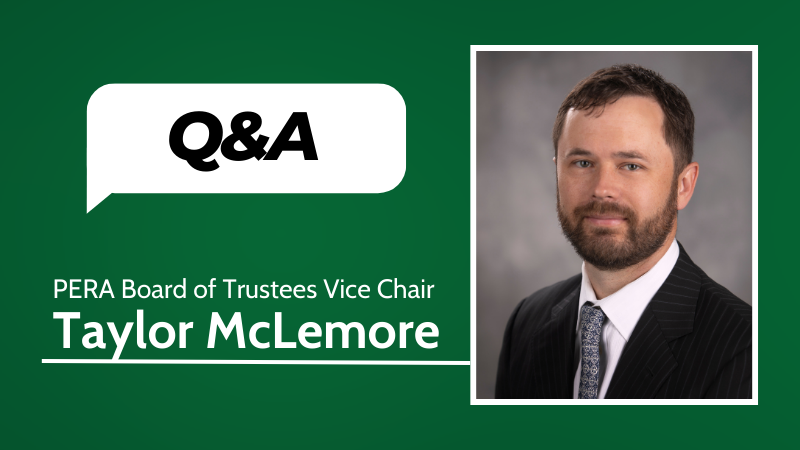Key points from this story:
- The PERA Board selected Empower Retirement as the new recordkeeper for PERA’s defined contribution (DC) plans
- Nothing will change for PERA members right away
- New actuarial assumptions mean it will take longer for PERA to reach full funding
- An automatic adjustment will likely be announced with PERA’s annual report in June
PERA’s Board of Trustees convened virtually for its regularly scheduled meeting on March 19. The Board heard updates from PERA staff on a number of aspects of PERA’s operations, and also took action on some items, including selecting a new recordkeeper for PERA’s defined contribution (DC) plans.
The Board also discussed how changes to PERA’s actuarial assumptions — estimates for inflation, rate of hiring and how long people will live, for example — will affect how long it takes for PERA to reach full funding.
Defined contribution plans recordkeeper
Background
PERA members who participate in the PERAChoice DC plan or PERAPlus 401(k)/457 plans know Voya Financial as the company that has been the recordkeeper for those plans since 2011. But recordkeeping needs change over time, so, last year, PERA began the process of reviewing its recordkeeping needs and selecting a recordkeeper who could deliver the best value for members.
Five companies responded to PERA’s request for proposals. At the March 19 meeting, the Board weighed the pros and cons of each company and voted to move forward with Empower.
What that means for PERA members
Nothing will change right away. At some point in the future, all accounts with Voya will be transferred over to Empower. After that happens, participants will be able to access their accounts directly through Empower, either by logging on to Empower’s website or by calling Empower on the phone.
Some of the advantages Empower brings to the table include:
- Significant experience with large public plans like PERA
- Expanded call center hours
- Enhanced digital and mobile tools
- Simplified account access
What’s next?
PERA staff will begin contract negotiations with Empower to finalize the details of the partnership and the transition from Voya to Empower.
PERA will be sure to communicate any changes to members before they happen.
What new actuarial assumptions mean for PERA
Background
Every four years, PERA conducts what is called an experience study. The Board uses this study as it reviews actuarial assumptions actuarial assumptions are projections about factors, including inflation and life span, that have an effect on PERA’s unfunded liability calculation, among other things.
An experience study compares the projections PERA had been using to the last few years of recorded data, known as “experience.” The Board can then adjust the actuarial assumptions PERA will use for the next four years. This rigorous review process keeps projections as accurate as possible.
Actuarial assumptions are grouped into two categories—economic and demographic. Economic assumptions include information like inflation, salary increases, and the projected growth in the number of employees hired by PERA employers. Demographic assumptions include information like the ages at which PERA members retire and how long people tend to live.
The last experience study took place in 2020. The Board updated its assumptions in November. The changes included revisions to the inflation, payroll growth, and active member growth assumptions, among others. Read more about those changes here.
What the new assumptions mean for PERA
At the March meeting, representatives from PERA’s actuarial consultant, Segal, provided further information to the Board on how specific assumptions will affect PERA’s calculations.
PERA’s liability — the cost of paying benefits to current and future retirees — changes when actuarial assumptions change. Some of those assumptions have a bigger impact than others. Positive investment returns, for example, can help reduce PERA’s unfunded liability, but lower-than-expected payroll growth and retirees living longer, and therefore receiving benefits longer, can have a bigger effect in the long term and add to PERA’s liability.
In this case, the newly adopted mortality and payroll growth projections will extend the estimated amount of time it will take PERA to achieve full funding. This doesn’t mean PERA is running out of money; rather that it will take longer than expected to reach its funding goals. One result of these changes is that an automatic adjustment, established in Senate Bill 18-200, will likely be announced when PERA releases its annual financial report in June, but the changes would not take effect until July 2022. These adjustments help keep PERA a secure benefit for current and future retirees. Read more about how PERA’s Automatic Adjustment Provision works here.
PERA’s Board is committed to maintaining this routine and rigorous review to ensure PERA is able to plan for the future and provide a secure retirement for all its members.
The Board’s next meeting is scheduled for June 18.
Automatic adjustment provisionA provision of Colorado law that automatically changes PERA contributions (from employers, employees, and the state) and annual benefit increases based on PERA’s funding progress.Actuarial assumptionData such as demographics, mortality rates, and investment returns that retirement plans use to calculate future assets and liabilities.Actuarial assumptionData such as demographics, mortality rates, and investment returns that retirement plans use to calculate future assets and liabilities.Actuarial assumptionData such as demographics, mortality rates, and investment returns that retirement plans use to calculate future assets and liabilities.Unfunded liabilityThe difference between the projected amount of money needed to pay benefits earned to date and the amount of money currently available to pay those benefits.Defined contributionA type of individual retirement plan in which an employee saves a portion of each paycheck (along with a potential employer match) and invests that money. The employee’s retirement benefit is based on their account balance at retirement. A 401(k) is a type of defined contribution plan.Defined contributionA type of individual retirement plan in which an employee saves a portion of each paycheck (along with a potential employer match) and invests that money. The employee’s retirement benefit is based on their account balance at retirement. A 401(k) is a type of defined contribution plan.





Your “informational” email could not have been much more vague. One question that you did not even address was whether these change will affect the monthly payments to current retirees. Also, will it affect future COLA increases in our monthly payments? Thank you.
Hi John, any changes that result from the new actuarial assumptions will not affect your monthly retirement benefit. However, an automatic adjustment, if necessary, would reduce the amount of your annual increase. More info on the Automatic Adjustment Provision is available here: https://www.copera.org/sites/default/files/documents/autoadjustment.pdf
Why are board members given increases when those of us retired see literally nothing in comparison. As per the Board Trustee Meeting minutes of Jan 2020, the executive director was given a 20% bonus, and others given a 5 % increase. HOW DARE YOU!! We see all of the adjustments of your reviews and little or no increases. The board should be in line with ALL PERA retirees and employees!
This is probably a very dumb question, but I’m retired under the DB plan, not DC. Does this mean this article does not affect me?
Hi Marti, the DC recordkeeping change only affects those who are enrolled in a DC plan and doesn’t affect your DB account.
To clarify: If you participate in a PERAPlus 401(k) or 457 in addition to your DB account, your 401(k) or 457 account will be affected by the recordkeeping change.
PERA Rep,
Please clarify further?
Isn’t it true that the article is forecasting the fact that although Marti’s Defined Benefit will not be changed, his Annual Increase to that DB will likely be reduced in a future year because they are changing the actuarial assumptions which are leading them to conclude it will take longer to reach full funding?
As I read the article it appears that if the Annual Increase is diminished in a future year as a result of this change announced in the article, Marti’s Annual Increase will not increase as it would have if they were not changing these actuarial assumptions.
Hi Paul, that’s correct. If an automatic adjustment (https://www.copera.org/sites/default/files/documents/autoadjustment.pdf) is announced in June, the annual increase for eligible benefit recipients would be decreased by up to 0.25% for the following year (2022).
Marti,
DON’T believe the POTI mouth’s reply!
Firstly, under Senate Bill-200 of 2018, the legislature changed your DB plan partially into a DC plan, by eliminating any real COLA and replacing it with a caveat (called an automatic adjustment) that basis annual increases, or lack thereof, on fund solvency and NOT inflation factors; secondly, the bulk of this story is very much about studies that will affect your future annual adjustments; and thirdly, it is a sham for PERA Board & Staff (PERA B.S.) to try and hide information about future actuarial assumptions in a story about changing DC plan record keepers!
And what affect does the State refusing to pay their PERA obligations another year (or more) because of economic impacts from COVID19?
Hi Roxana, thanks for the question. As of right now, the state is expected to make its usual $225 million direct payment to PERA this year.
They did not pay last years 250 million. They should pay 500 million this year by prioritizing new federal funds. What is Pera doing about this?
Hi Sue, PERA continues to engage with lawmakers regarding any potential changes in contributions to PERA, including the $225 million annual direct distribution. The recently approved stimulus package does include state and local aid, but prohibits the deposit of those funds in to pensions. Be sure to check the legislation section of PERA On The Issues regularly for any introduced legislation concerning PERA: https://peraontheissues.com/category/legislation-governance/
Does the State of
Does the State of CO still owe PERA $25 million? If so, why does this continue? How can PERA put the squeeze on the state for this money? The state will continue to overspend and we all know this. Do not keep postponing this issue.
colorado
Are we getting a cost of living for retirees this year please answer
Hi Eleanor, yes, eligible retirees will receive an annual increase of 1.25% in July.
Are you still working on trying to get PERA retirees the Social Security they have earned (Regan Windfall Act)? It sounds like our PERA retirement won’t be keeping up with inflation so this would be something that is needed.
WEP is out of PERA’s hands so there is not really anything they can do to effect its repeal. It’s up to Congress and unlikely, in my opinion.
A bill that would repeal the WEP and GPO has been introduced in Washington, DC and we’re keeping track of it here: https://peraontheissues.com/wep-gpo-bill-introduced-in-d-c/
Doesn’t Pera pay for a federal lobbyist? If so, why do we continue with the same unsuccessful firm?
Wondering how much the State reneging on their obligations under SB18-200 to pay its employer contribution ($225 million) had an effect on the coming adjustments? All PERA employees and retirees had to follow SB18-200 to the letter of the law, but the State can just opt out. How is that fair? With all the Federal funds coming into the State, they should make up for the $225 million they didn’t pay PERA!
The State not paying their employer contributions to PERA from the early 2000s for nearly 15 years is the main cause of PERA’s financial problems.
I agree. Why doesn’t Pera introduce legislation to add a year to the 30 year deadline for each year of nonpayment of the States 250 million obligation? Why aren’t they demanding that Federal funds be used to fill the financial hole from last year? Pera consistently appears to be non proactive on our behalf. Having leadership that aren’t fighters but accountants is imperiling retirees finances. No one can live on the colas they “negotiated” on our behalf. What other state retirement associations have enacted such punitive measures? I doubt any except Colorado.
The report on the change in actuarial assumption is PERA’s way to telegraph the news that the Annual Increase (in benefit payout) will be less going forward. What inflation?
Barry,
They tried to fool us didn’t they, by hiding the news about actuarial assumptions in a story about dumping VOYA… I only read this today and would have thought it was an April Fool’s Day joke, except it reeks of the typical half truths spewed by PERA Board & Staff (PERA B.S.).
I am venting here and I have worked in Private Industry so I have paid into Social Security. Because of WEP I can’t receive my $500 dollars per month that I worked and paid into SSA. As a PERA retiree I can use this $500 to pay for my bills/medicine/insurance etc. This is so unfair.
Since the PERA Board selected Empower Retirement as the new recordkeeper for PERA’s defined contribution (DC) plans does this mean any portfolio management fee that was paid to Voya will automatically terminate too? Or, do I need to call/write Voya to cancel this management fee?
Hi Mark, at this point there is no need to contact Voya regarding the change. We will share more details about the transition as soon as they have been finalized.
Ok, thank you for the response. Have a great day.
Firstly, under Senate Bill-200 of 2018, the legislature changed our DB plan partially into a DC plan, by eliminating any real COLA and replacing it with a caveat (called an automatic adjustment) that bases annual increases, or lack thereof, on fund solvency and NOT solely on inflation.
Secondly, the bulk of this story is very much about studies that will impact our future annual adjustments (and not for the better), by changing actuarial assumptions.
Third, but hardly last or least, it’s a sham for PERA Board & Staff (PERA B.S.) to try and hide information about future actuarial assumptions in a story about changing DC plan record keepers!
Note to the author of this article: Those of us who are pensioners have a strong interest in knowing the financial impact or potential financial impact on our pensions (including Annual Increases). The article you wrote addresses substantive issues that are inextricably linked to our future pension payments. However, you only alluded to that and left out what in my opinion should have been a “Key Point.” We had to ask multiple questions in this Comment Section before a PERA Representative eventually gave a specific statement about the potential impact on our July 2022 pension payments. After multiple questions, the Representative told us,
“…If an automatic adjustment (https://www.copera.org/sites/default/files/documents/autoadjustment.pdf) is announced in June, the annual increase for eligible benefit recipients would be decreased by up to 0.25% for the following year (2022)”
Leaving out a key point like this is at best a case of not knowing your audience.
Note to pensioners: We need new legislation that specifically creates a Cost Of Living Adjustment instead of the evaporating “Annual Increase” and it should be tied to a formula that ONLY considers traditional economic indicators of inflation that are routinely used to assess the cost of living. I hope all PERA members will contact their legislators to make that request. If life is good for you and you don’t need a COLA, think about somebody you worked with that you know does not have the additional resources to offset the cost of living increases we will see in the years to come and contact your legislator in their interest.
This is pitiful! Increases should at the very least be connected to cost of living and at the same rate. This was my understanding when I retired. You have a responsibility to make it happen, and, as stated previously, the board should not be receiving 5% increases and 20% bonuses when the people they represent are struggling. Again, shame on you!!!
PERA is little more than a pyramid scheme. Giving away benefits circa 2000-2018 and expecting the younger still employed paying for decades of incompetent management and the failure of government/governors/legislators to live up to their responsibilities. You have little credability; keep hiding in your covid caves.
The change to Empower brings up an issue for me of my RMD payment for calendar year 2021. As of today I have not received information from VOYA regarding my RMD for 2021. Since the change to Empower will probably happen before the end of the year can I assume I will have to wait until the change before I know my RMD for 2021?
Why are board members given increases when those of us retired see literally nothing in comparison. We are constantly seeing that adjustments are being made to make the plan more solvent, and thus no increases can be given. But, as per the Board Trustee Meeting minutes of Jan 2020, the executive director was given a 20% bonus, and others given a 5 % increase. HOW DARE YOU!! The board increases should be in line with ALL PERA retirees and employees! And, you have a responsibility to insure annual increases are in line with cost of living.
I used to work in local government Budgeting (now retired) We projected future years with many assumptions. Our colleagues in Accounting looked at current and prior years, and were governed by various national legal and accounting standards, including the Governmental Accounting Standards Board (GASB). In your message to us you use the term “Unfunded Liabilities”- which are funds that you hold that are obligated to other purposes, other than current operational and retirement payments. An example of this was a requirement of GASB that -simplistically- required in Statement 68 changing the requirement in reporting “Unfunded Liabilities”. Could we please have a readable and understandable description of Unfunded Liabilities, and their effect on the need for an Automatic Adjustment, that doesn’t require the reader to have a knowledge of accounting? Thanks.